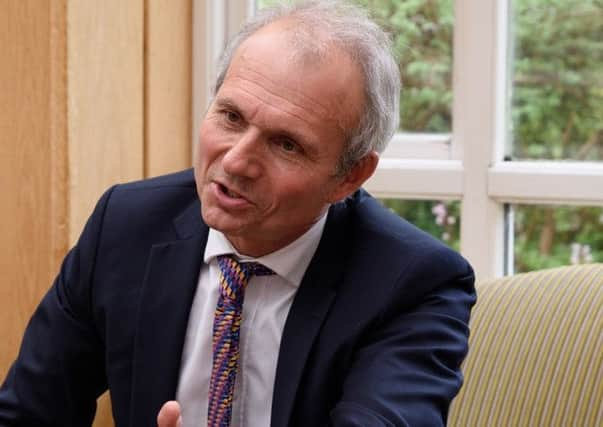SF wants British-Irish body to discuss devolved matters


Sinn Fein yesterday called for the meeting of the British-Irish Intergovernmental Conference to discuss devolved matters – despite the Belfast Agreement precluding it from doing so.
Advertisement
Hide AdAdvertisement
Hide AdThe British and Irish governments will formally meet for the first meeting of the BIIC in 11 years, a meeting which was called after pressure from Sinn Fein, the SDLP and the Irish government.
The DUP has played down the significance of the London meeting, describing the forum as a “talking shop” with no executive powers to decide on any of the issues which are the responsibility of Stormont’s dormant institutions.
However, some other unionists are concerned at the potential for the body to stray beyond its legal remit and give the appearance of joint British-Irish rule of Northern Ireland.
Tomorrow’s meeting will be chaired by Theresa May’s de facto deputy, David Lidington, in the Cabinet Office.
Advertisement
Hide AdAdvertisement
Hide AdThe meeting will be attended by Secretary of State Karen Bradley, the Republic’s Deputy Prime Minister, Simon Coveney, and Irish Justice Minister Charlie Flanagan.
It is expected that a joint communiqué will be issued after the meeting.
When asked yesterday, neither the British nor Irish governments would release the agenda for the meeting but earlier this month the Fianna Fail leader said the agenda was “singularly disappointing” and “limited”.
Last month, when the meeting was called, the Irish government said that it would “discuss the effective operation of the institutions of the Good Friday/Belfast Agreement; North/South security co-operation; and bilateral co-operation between the British and Irish governments”.
Advertisement
Hide AdAdvertisement
Hide AdThe Belfast Agreement states that the BIIC is to “promote bilateral co-operation at all levels on all matters of mutual interest within the competence of both governments”, with its meetings limited to “non-devolved Northern Ireland matters, on which the Irish fovernment may put forward views and proposals”.
However, Sinn Fein vice president Michelle O’Neill called for the body to look at a range of devolved matters.
She said: “Discriminatory positions on marriage equality, language rights, coroners inquests and women’s health are simply unacceptable for any administration that wishes to describe itself as democratic and egalitarian.
“In addition to these rights issues, there are a number of other areas that must be addressed as a matter of urgency, including Boundary Commission changes; Policing Board appointments; cross-border bodies; the All-Ireland Single Electricity Market, the impact of austerity cuts on our public services like health and education and, of course, Brexit.
Advertisement
Hide AdAdvertisement
Hide Ad“Resolving these issues at the Inter-governmental conference and within the framework of the Good Friday Agreement would present a clear pathway back to re-establishing the institutions.
“But that will require the British government setting aside its own self-serving pact and finally confronting the DUP’s anti-rights, anti-democratic and anti-equality agenda.”
The DUP has for several months derided the BIIC as a “talking shop”, something repeated by DUP MLA Gordon Lyons yesterday.
He said: “It is not a structure where decisions can be made about our roads, hospitals, schools or economy. For Sinn Fein, it is a smokescreen to distract from the fact that they stand isolated in boycotting the Northern Ireland Assembly, the Northern Ireland Executive and the House of Commons.
Advertisement
Hide AdAdvertisement
Hide Ad“Northern Ireland has been without a ministerial-led government for over 18 months. Sinn Fein’s failure to get back into government has had a profound effect on our public services. Ministerial decision-making has been left in limbo. The public are not crying out for more talking. They want decisions to be made.
“If Sinn Fein really wants to discuss matters relating to Brexit, the economy, social matters, reform to our health service, then it’s time the party got back into a functioning Executive with nothing but its mandate.
“Instead, Sinn Fein has turned its back on delivering for the people of Northern Ireland and prioritised narrow political demands.”